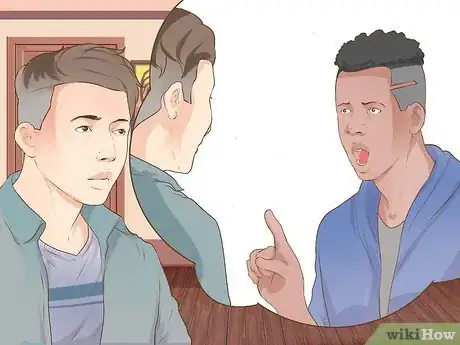This article was co-authored by Jessica George, MA, CHt. Jessica George is a Marriage and Family Therapist, Certified Professional Master Life Coach, and Co-Founder of Evolve Therapy Coaching based in Glendale, California. With more than 20 years of experience, she specializes in hybrid therapy and coaching services, couples counseling, and clinical hypnotherapy. Jessica holds a Bachelor’s degree from The University of California, Santa Barbara and an MA in Counseling Psychology and Talk Therapy from Ryokan College. Jessica is trained in the Imago technique and the Gottman method for couples therapy. She also earned a Professional Life-Coach Certification from The Fowler Academy and an Infinite Possibilities Relationship Certification. She is a member of the International Board of Coaches and Practitioners (IBCP).
wikiHow marks an article as reader-approved once it receives enough positive feedback. This article has 51 testimonials from our readers, earning it our reader-approved status.
This article has been viewed 259,997 times.
Everyone encounters annoying classmates—peers that get under your skin and drive you temporarily mad. While you don’t have the authority to control their behavior, you have the power to manage your physical and verbal response to their actions. Instead of giving them the satisfaction of knowing that they are annoying you, ignore them. At the end of the day, you won’t regret remaining cool, calm, and collected.
Steps
Managing Your Emotions and Reactions
-
1Calm and center yourself. Annoying people tend to bring out the worst in us. When you feel yourself getting frustrated and overwhelmed by the actions of those around you, take a moment to compose yourself. This is important to ensure that your mind is clear and to avoid any irrational responses.
- Take a long, deep breath in, followed by a slow exhale. Continue to take deep breaths until you feel in control of your words and actions.
- As you breathe, you may find it helpful to repeat a simple mantra to yourself, such as “serenity,” “tolerance,” or “love.” Focus on your one word mantra instead of your annoying classmate.[1]
-
2Choose to remain silent. When an annoying classmate intentionally, or perhaps unintentionally, pesters, teases, or provokes you, the only thing you have control over is how you respond. Don’t fuel their negative behavior with poor behavior of your own. Choose to remain silent. Silence is not equivalent to weakness or cowardliness. Rather, it can be the mark of a strong individual who has control over their emotions.[2]
- While some situations benefit from inaction, others do require our attention. If a classmate is bullying you or others, stand up for what is right.
Advertisement -
3Check your nonverbal responses. In addition to expressing our annoyance with witty remarks and spiteful comments, our bodies also convey our annoyance with eye rolls, mutters, and disgruntled faces. If you are truly going to ignore your annoying classmate, you need to limit or minimize your physical response to their behavior too. Don’t groan, sigh, or roll your eyes when they do or say something that gets on your nerves.[3]
- Just smile and move on. They may be trying to get a rise out of you, so don’t give them that power!
-
4Put the incident in perspective. In the moment, it is easy to fixate on the annoying behaviors of others. Their quirks can consume our thoughts and drive us mad! To prevent yourself from overreacting, you must ask yourself this: does their annoying behavior negatively affect my life beyond this moment? Most of the time, the answer will be “no.”[4]
Ignoring Clowns, Competitors, Chatters
-
1Pay no attention to the class clown. Jokers, or class clowns, devote their time and energy to providing comic relief for the classroom. When you are in the mood for the class clown’s antics, their jokes are hilarious; when you are not in the mood, their attempts and humor can drive you mad. Since class clowns thrive on the reaction of their “crowd,” the best way to ignore a joker is to have no physical or verbal reaction to their jokes.
- Class clowns aim to please and are highly sensitive to criticism. If you can not remain silent, a choice remark could put a temporary end to their comedy bit.
- If you get in trouble for something the class clown did, don’t overreact. Remain calm and ask the teacher to speak with you after class. When you are speaking one on one with the teacher, explain your side of the story and apologize for any inconvenience you may have caused. Work with your teacher to develop a plan on how to avoid situations like this in the future.
-
2Limit your interactions with competitive students. Overly competitive students thrive on the knowledge that they are better than others. Their determination to prove themselves as superior students can leave others in the class feeling unintelligent and overlooked. If a competitive classmate asks you how you did on an assignment, they are just looking for chance to brag about their score. When this happens, just walk away. If their pestering persists, tell them that you prefer to keep your grades private.
- For example, you may say: “Sorry, I like to keep that kind of information to myself,” “You did really well on the test. Thanks for sharing your score; I prefer to keep mine private,” or “Please stop asking me. I am not comfortable sharing my grade with you.”
-
3Tune out chatterboxes. Overly talkative classmates often struggle with self-awareness and egotism. Ignoring chatterboxes is extremely difficult. Their incessant chatter is inconsiderate and distracting. Try to tune them out and stay focused on the lecture or task at hand. If necessary, politely ask them to be quiet or speak softer.
- For instance, you may say: “I’m having a hard time hearing the teacher. Will you please lower your voice or stop talking?” or “Your talking is really distracting me. Can you stop talking so that I can focus?”
- If you could not hear what your teacher said, raise your hand and ask them to repeat it. “Sorry, I missed what you said over all the chatter. Can you say that again, please?”
- If you are at your wits end, seek help from your teacher. Stay after class and talk to your teacher about the chatterbox. Your teacher may rearrange the seating chart and or talk to the student privately.
Ignoring Detached, Shy, and Clueless Classmates
-
1Do not concern yourself with detached classmates. When the teacher devotes time to trying to engage a detached student, your classmate’s inability to actively participate can become annoying. While this can feel like a waste of time, you must remember that it is part of the teacher’s job. Instead of concerning yourself with this student’s disinterest, use the time to get homework done.
- If you have to work with this student in a group setting, don’t waste your energy trying to get them to help. Instead, ignore them and do your best to compensate for their lack of participation.
-
2Remain patient with shy classmates. If you are partnered up with a shy student, you may find their struggle to interact with you annoying. Unlike the detached student, you can’t just ignore your shy classmate. Do your best to engage your partner in conversation.
- Before you start on the project, try to get to know them first. If they feel connected and comfortable around you, they may be more inclined to talk.
- Consider trying a few icebreakers.
- Play a quick round of two truths and a lie. List two true statements and one lie about yourself. Your shy partner must guess which statements are true and what statement is false.
- Tell a few jokes or riddles.
- Ask your partner a series of random questions. These could include: what’s your favorite food, where were you born, what’s your favorite carnival ride, do you play any sports, or do you have a pet? Let your partner ask you a few random questions too![5]
-
3Occupy yourself when clueless classmates talk. While you may master content easily, others students might struggle to comprehend what they are learning. If you have a classmate that constantly asks for clarification, don’t shame them for trying to understand the material. As they talk to the teacher, do your best to check your verbal and physical responses. If you won’t benefit from the additional clarification, occupy yourself with other homework or activities.
References
- ↑ https://www.psychologytoday.com/blog/wander-woman/201308/how-deal-annoying-people
- ↑ https://www.psychologytoday.com/blog/wander-woman/201308/how-deal-annoying-people
- ↑ https://www.psychologytoday.com/blog/wander-woman/201308/how-deal-annoying-people
- ↑ https://www.psychologytoday.com/blog/wander-woman/201308/how-deal-annoying-people
- ↑ http://www.eslconversationquestions.com/icebreakers-speaking-activities/
About This Article
Annoying classmates can be distracting when you’re trying to focus, but it’s best to stay calm and try to ignore them. Class clowns are often trying to get attention, so responding to them can make things worse and risk getting you in trouble too. If you feel yourself getting frustrated, try taking a few deep breaths to calm down. If your teacher doesn’t deal with them, try asking them nicely to be quiet. If you can’t hear your teacher when they’re talking, raise your hand and ask them to repeat what they said, since you couldn’t hear. This should give them a hint to deal with your annoying classmates. You can also stay behind at the end of class and tell your teacher. They might talk to the students or change the seating plan. For more tips, including how to deal with annoyingly competitive students, read on!







































































